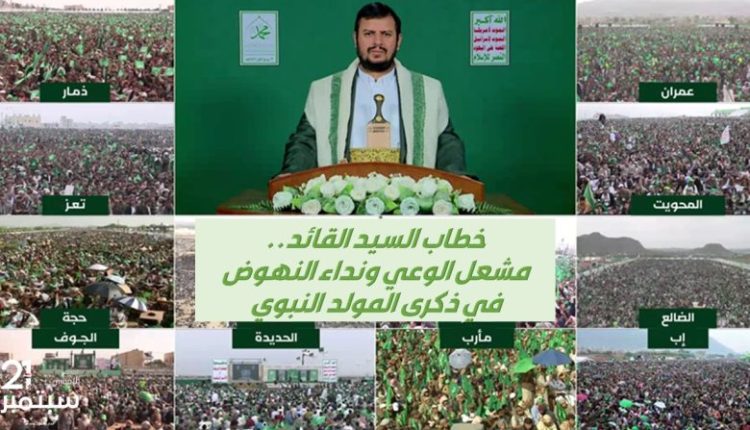Leader’s Speech: A Beacon of Awareness and a Call to Rise on the Prophet’s Birthday
The speech delivered by Abdul-Malik Badr al-Din al-Houthi on the occasion of the Prophet’s birthday was not merely an emotional address or a passing ceremonial ritual. Rather, it came as a comprehensive strategic document, carrying the imprint of leadership and renewal. It revealed deep Qur’anic insight and prophetic vision in reading the current reality of the Muslim community and diagnosing its ailments.
He highlighted the root causes that led Muslims into a state of fragmentation and disappointment — beginning with distancing from the Qur’an and the Prophet’s path, passing through the betrayal of client regimes, and ending with submission to foreign powers.
In contrast, he presented practical solutions and a roadmap inspired by the Prophet’s life, aimed at restoring confidence and capacity within the Muslim community. He emphasized that the occasion should serve as a moment of awareness, mobilization, and revival — reinforcing identity, strengthening collective stance, and urging nations to pursue liberation and resist tyranny.
1. The State of Subordination
The leader stressed that today’s condition of the Muslim world stems from rulers tied to foreign powers, becoming tools of hegemony while abandoning the community’s causes and sacred responsibilities.
Awareness: Exposing the roots of internal weakness.
Mobilization: Revealing the role of dependent regimes and encouraging rejection.
Revival: Urging independence and recovery of self-determination.
2. Distancing from the Qur’an
He underlined that the Qur’an has been reduced to empty rituals, losing its function as a guide for life and action.
Awareness: The Qur’an is a way of life, not just recitation.
Mobilization: Inspiring a return to it as a framework for struggle and progress.
Revival: Rebuilding collective awareness upon Qur’anic principles.
3. The Prophetic Example
He insisted that the Prophet was not a symbolic figure to be commemorated but a practical leader who built a state founded on justice.
Awareness: The Prophet’s biography is a roadmap, not mere stories.
Mobilization: Inspiring steadfastness, struggle, and resistance against oppression.
Revival: Making the Prophet a practical motivator for renaissance.
4. Palestine as the Measure of Truth
He argued that the position on Palestine and opposition to Israel and the United States is the real test of Islamic authenticity.
Awareness: Palestine is central, not marginal.
Mobilization: Exposing normalization and affirming responsibility toward resistance.
Revival: Making Palestine a unifying cause and field of action.
5. Confronting Global Powers
He emphasized that confronting dominant global powers is not optional but a necessary condition for freedom.
Awareness: Revealing the true nature of global hegemonic projects.
Mobilization: Urging collective resistance to military, political, and economic domination.
Revival: Framing the struggle as one of existence and identity.
6. The Prophet’s Birthday as a Launchpad
He called for making the Prophet’s birthday an occasion for recommitment to God’s message and for launching practical projects, rather than limiting it to celebration.
Awareness: Connecting the occasion to the Prophet’s mission.
Mobilization: Gathering the community around a unified Qur’anic project.
Revival: Turning the commemoration into a springboard for civilizational revival.
7. Yemen at the Forefront
He stated that Yemen, through its revolutionary path, stands at the forefront in defending the Prophet, the Qur’an, and Palestine.
Awareness: Presenting Yemen as a model of liberation and awareness.
Mobilization: Inspiring other Arab and Muslim nations to follow.
Revival: Affirming that any nation can achieve independence if it adheres to Qur’an and Prophetic guidance.
A Comprehensive Roadmap
The speech was presented as a roadmap for the Muslim community — diagnosing its weaknesses, exposing betrayal by rulers, and offering Qur’anic and Prophetic solutions for revival.
It combined awareness of decline, mobilization against external threats, and inspiration for building a strong and dignified nation. Thus, its significance extends beyond the event itself, offering a renewed project for the entire Muslim world.

